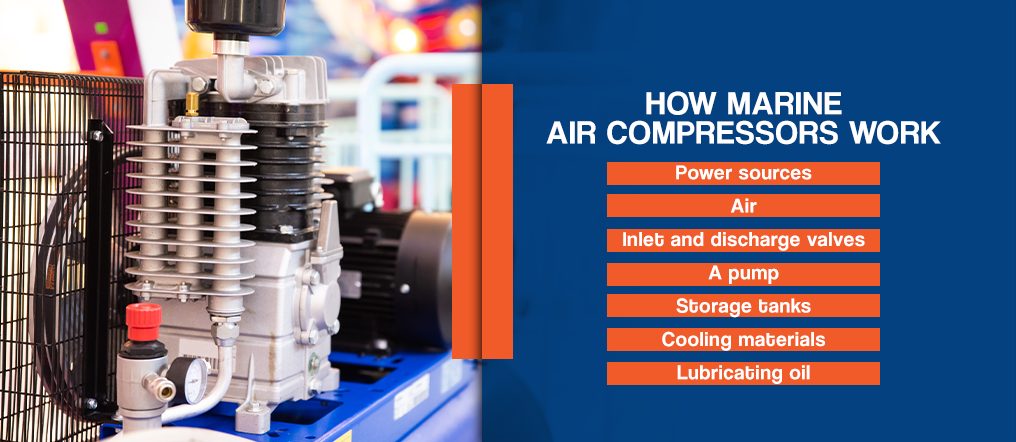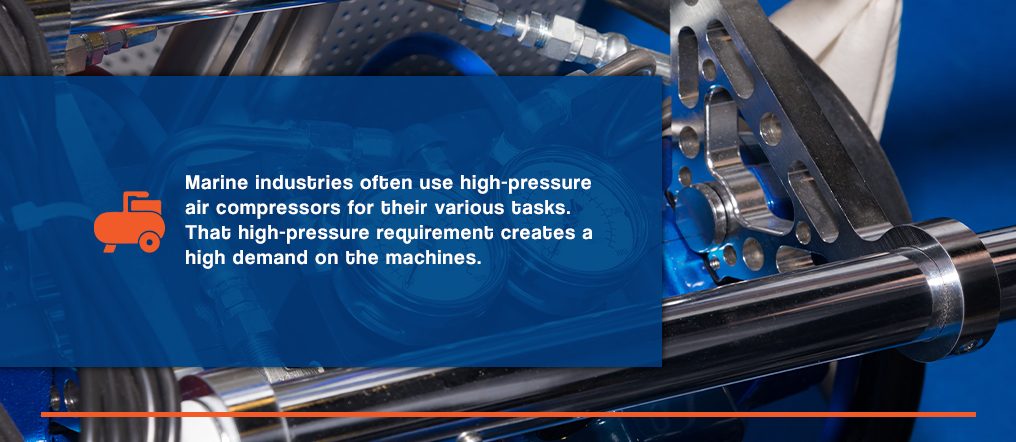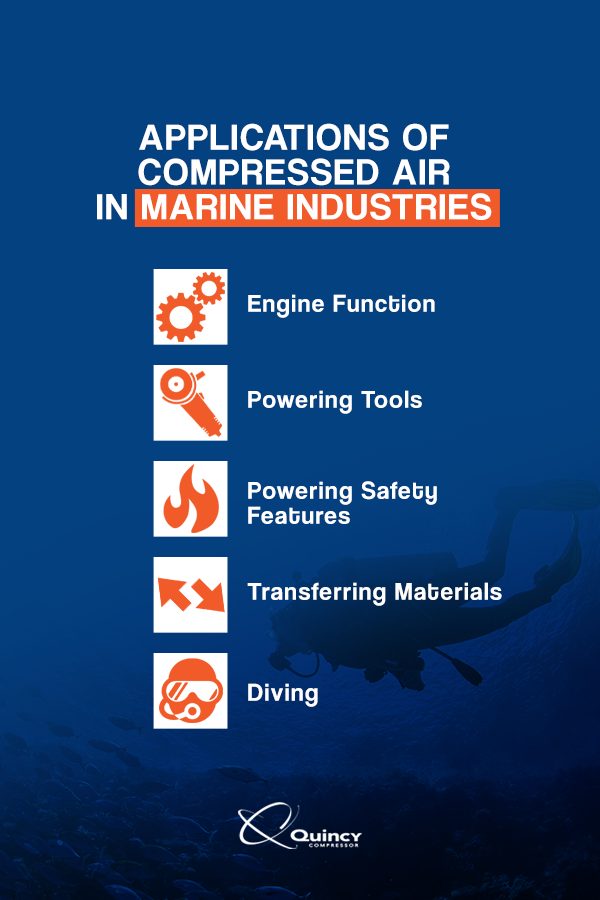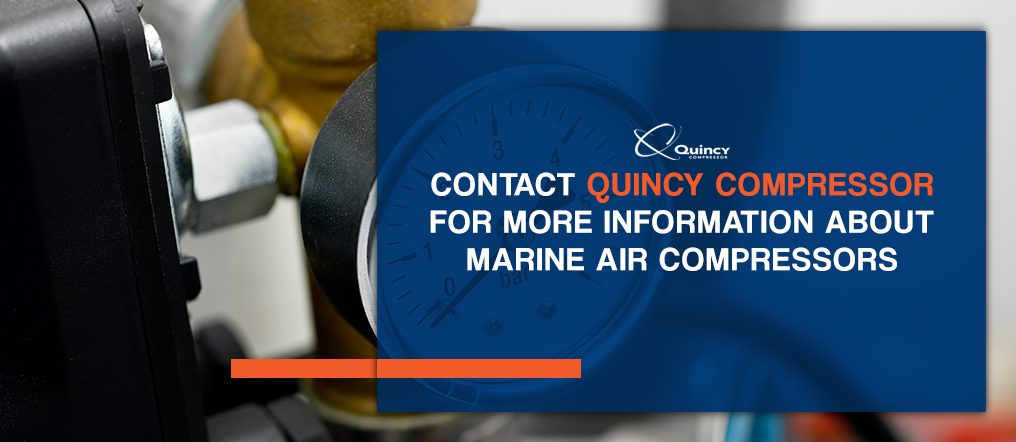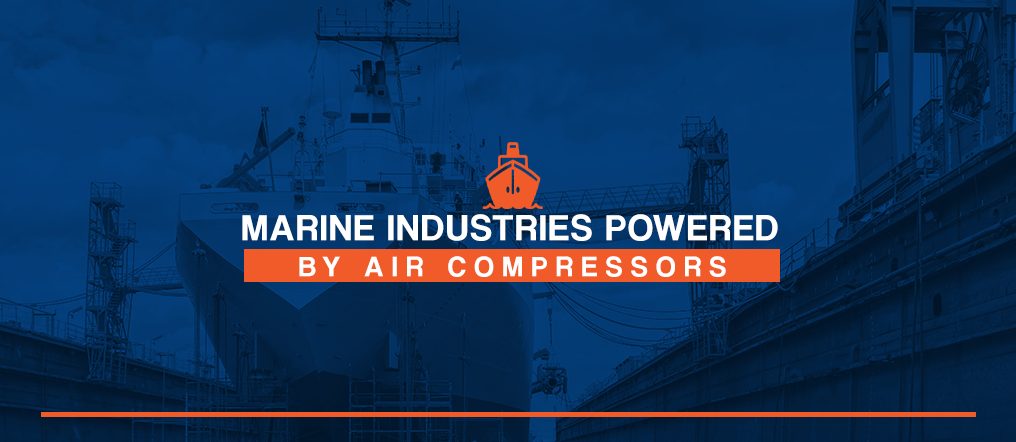
Marine industries, from offshore operations and cargo shipping to fishing and recreational cruises, require a lot of equipment to function. They operate in unique conditions, heading out onto the open waters and relying on everything on board to keep them moving. You’d probably consider water as the primary useful element for marine industries, but air is equally vital.
The element serves practically endless purposes for marine industries powered by air compressors. It’s versatile across several applications and essential for different functions. In fact, without air compressors, many ships couldn’t even leave the port. Discover more about marine industries and air compressors in this guide.
How Marine Air Compressors Work
Marine air compressors function similarly to air compressors you’d find on land-based operations for the most part. Where they differ is the environment they function in. The parts and materials that help marine air compressors function include:
- Power sources: Air compressors may utilize electric or gas motors to run. The type you have in a marine industry will depend on your ship’s power supplies, but if you use a generator onboard, you may have an electric-powered air compressor.
- Air: An essential component of a compressor is, of course, air. Air compressors take in the air around them to function. Ideally, that air will be as clean as possible to help prevent material from building up in the compressor’s filter.
- Inlet and discharge valves: These components draw air in and release it so the air compressor can function. Air comes in through inlet valves, and the system creates a vacuum. Once the system compresses air, a discharge valve allows users to harness the power of the compressed air.
- A pump: To compress the air, an air compressor uses either positive or dynamic air displacement. The internal mechanisms move and push air through the chamber to create compressed air.
- Storage tanks: Once the machine compresses the air, it moves to a storage tank for future use. Air compressor storage tanks come in a range of sizes, and what you select will depend on your industry’s needs and how much space you have.
- Cooling materials: Machinery often needs to be cooled between stages. Air compressors for marine industry operations may use seawater or other cooling materials to maintain a safe operating temperature. That protects the components of the system from overheating and becoming damaged more frequently.
- Lubricating oil: Because an air compressor consists of moving parts, it may use oil to stay lubricated. Lubrication helps reduce friction in the equipment, which would cause more wear over time.
Issues Marine Air Compressors Face
Marine industries and air compressors face unique challenges you won’t find on land. The main concerns stem from asking, “How are air compressors used in water-based industries?” You’ll have to consider exposure to specific materials.
Ships and other industries out on the water experience wet conditions. Salt from the ocean water also poses a threat to equipment. Saltwater causes certain metals, like iron, to rust more quickly than freshwater would. That means metal components on a ship may rust more quickly, whether or not they’re in direct contact with water. Saltwater vapor surrounds a ship on the ocean, while ocean water may splash on board. Even if the air compressors are below deck on a ship, they can still face exposure to these elements.
Because marine air compressors function in wet conditions, they may have parts made of metals that won’t rust or corrode. Aluminum, galvanized steel and certain varieties of stainless steel, for instance, won’t rust. Still, marine industries want to use durable metals and materials that can withstand frequent use.
Maintenance of Marine Air Compressors
Marine industries often use high-pressure air compressors for their various tasks. That high-pressure requirement creates a high demand on the machines. Maintaining a marine air compressor is vital because the systems undergo so much use. Industries may conduct particular maintenance checks daily or after an air compressor has been running for a set number of hours.
Depending on your ship’s size and operation, you may need to bring replacement parts and tools to make repairs when you’re out on the water. That will suffice for emergency repairs to keep units functioning until you return to land. You can then repair non-emergency issues on land so your system can function at its best on the water. No matter how you maintain marine air compressors, you’ll have to:
Keep the Systems Dry
Are air compressors safe to be in water? That will depend on the specific machine. In general, you don’t want an air compressor to be submerged or constantly sitting in water. You risk creating rust and damaging vital parts of the unit. Water can also cause a problem if it gets in the machine. Marine industries using air compressors have to conduct regular maintenance to keep the system dry, and that can include steps like these:
- Drain the air receiver tank: When air reaches the air receiver tank, it cools down. That means any water vapor in the previously hot air will condense back to a liquid state. Because of that process, the air receiver tank will often have water in it, so you’ll have to drain it daily. Some machines have an automatic drain function, which would be useful if you have a small or busy crew.
- Maintain the water separator filter: A water separator removes moisture from the machine’s air supply. Depending on the equipment, you may find separators that remove around half of the moisture in the air. For a marine industry, that may not be enough. Maintain the water separator to ensure it’s doing its job.
- Check the refrigerated air dryers: For further moisture removal, marine industries may use refrigerated air dryers with their compressors. These features cool air so it holds less moisture, collects water and removes it from the system. Check that this excess water drains properly, and make sure the refrigerated air dryer functions correctly if you have one.
- Check the desiccant air dryers: Instead of cooling the air to remove moisture, desiccant air dryers absorb potential contaminants. Solid desiccants react with water to create ultra-dry air. Replace the desiccant as needed, and check the rest of the component to ensure it functions correctly.
Check for Leaks
When an air compressor, on land or on sea, has leaks, it won’t operate as efficiently. You use more of your power supply to run the machines, costing you money and valuable resources that may be limited when you’re out on the water. Routinely checking your marine air compressors for leaks will save you from potential disasters or significant wastes. Check for leaks along components of an air compressor like:
- Piping
- Couplings
- Fittings
- Joints
- Drains
Check for the Proper Pressure
When you have the right pressure in your air compressor system, you can operate efficiently. You’ll have exactly what you need for the various tasks you have on a ship or offshore worksite. When you’re operating at the wrong pressure, you could face different issues depending on whether it’s too low or high:
- Low pressure: Low air pressure issues can happen when you have leaks in your system. A faulty discharge valve may open too early, or suction valves may not close fully, causing more low-pressure problems. With low pressure in your air compressor, your system will have to work harder and use more power to function. You waste power and put unnecessary stress on the equipment, which could lead to damage.
- High pressure: Suction valve fails or blocked piping could cause pressure to build up or be too high. If the pressure is too high in your air compressor, it could create a dangerous situation. The high pressure can also damage components of the system.
To ensure you have the right pressure in your systems, another part of maintenance will be checking any pressure gauges. Make sure they provide accurate readings so you know if your air compressor is leaking or building up pressure.
Applications of Compressed Air in Marine Industries
Air compressors are versatile machines on and off land. They have many uses in various marine industries. Because of an air compressor’s versatility, a ship may have multiple compressors in their system. Depending on the industry and a particular crew’s needs, you could find marine operations using multi-stage air compressors or rotary screw compressors. So what marine industries use air compressors? A wide array of operations find use for this machinery. Applications of compressed air in marine industries include:
Engine Function
Air compressors are vital to a ship’s movement since they help operate engines. The machines help start, automate and control a ship’s main and auxiliary engines. Marine industries often use a main air compressor to start the engines. Almost any industry that must enter and leave a port may require a main air compressor to help operate the engines onboard.
Powering Tools
This function is similar to how you’d use air compressors on land. Pneumatic tools require compressed air to function. Marine industries and air compressors work with tools like these powered by compressed air:
- Chisels
- Drills
- Wrenches
- Grinders
Offshore work and various marine industries require tools to complete their tasks. Ships may also have pneumatic tools to make emergency repairs to the ship or equipment on board.
Powering Safety Features
When you’re on a ship for any industry, safety is paramount. Weather conditions, encountering other boats on the water and onboard emergencies are just some of the issues a marine industry crew may face. Air compressors help power certain safety features to help the crew deal with:
- Alerting: Ships utilize air compressors to power safety features like foghorns and ship whistles. The crew can then alert other ships of their presence, especially in poor weather conditions.
- Fires: Fire pumps use air compressors to transfer seawater to put out fires. Ships have to rely on their own resources when there’s an emergency, making air compressors vital for those situations.
- Soot: Particulates and fuel residue from a ship’s engine can build up in the boiler. That build-up could lead to a fire under particular conditions, creating a dangerous situation. The crew should conduct a regular soot blow of areas like the boiler tubes with an air compressor to keep the ship and its crew safe.
- Evacuations: If everyone on a ship needs to evacuate, air compressors may help operate the lifeboats. The crew will need to heave up the boats and lower them to the water, which an air compressor may do, depending on the ship’s design.
These safety features are unique compared to other industries’ needs. Offshore work and different ships require safety equipment or procedures that air compressors can power or complete.
Transferring Materials
Ships and offshore operations have pneumatic pumps to transfer materials. Drilling sites may transfer oil and other materials for operations using air compressors. Any marine industry may use air compressors to transfer water, either fresh or waste, to different areas of the ship or worksite.
For freshwater and other materials that need to remain pure, a marine industry may select an oil-free air compressor. Other air compressor varieties may get oil or moisture in the lines, which could then transfer to and contaminate whatever material it transports.
Diving
Industries like research and recreation can go scuba diving with air compressors. Individuals who scuba dive probably won’t invest in their own scuba diving air compressors, but professionals and companies that offer recreational diving may. Scuba tanks require high pressure to fill, and many regular air compressors don’t provide those high levels. Scuba air compressors also have filters to purify the air of moisture, oil and contaminants.
Scuba air compressors are similar to ones that fill oxygen tanks and air supply tanks that firefighters use. Divers breathe that air while underwater, so it has to be reliably pure and at the correct pressure to withstand conditions below the ocean’s surface. You may not see these compressors on marine industry ships as often as you would other types.
Contact Quincy Compressor for More Information About Marine Air Compressors
At Quincy Compressor, we provide dependable machinery, parts and service to various industries, including marine operations. We understand that you face unique challenges in a marine industry, and we have the solutions to help. Choose from our versatile selection of systems, including reciprocating and rotary screw air compressors. We also offer the additional equipment you may use for your operations, including air treatment equipment designed to work with our air compressors.
Find an authorized Quincy dealer near you to get the right equipment for your marine industry. If you’re unsure what you need for your operations, contact us today.



